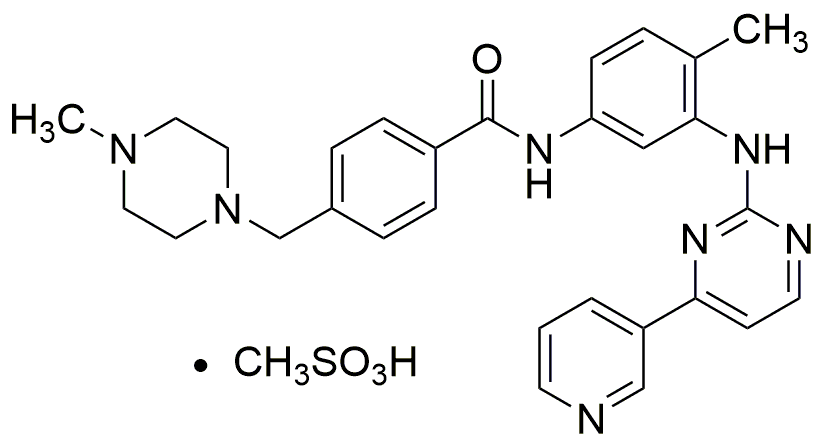|
Imatinib mesylate is widely utilized in research focused on:
- Cancer Treatment: Primarily used in the treatment of chronic myeloid leukemia (CML) and gastrointestinal stromal tumors (GISTs), providing targeted therapy that significantly improves patient outcomes.
- Pharmaceutical Development: Serves as a key compound in the development of new cancer therapies, allowing researchers to explore combination treatments that enhance efficacy and reduce resistance.
- Biomarker Research: Used in studies to identify biomarkers for cancer progression, helping to tailor personalized treatment plans based on individual patient profiles.
- Drug Resistance Studies: A valuable tool for investigating mechanisms of drug resistance in cancer cells, aiding in the development of next-generation therapies that can overcome these challenges.
- Clinical Trials: Frequently involved in clinical trials aimed at assessing new formulations or delivery methods, contributing to advancements in cancer care and improving patient quality of life.
General Information
Properties
Safety and Regulations
Applications
Imatinib mesylate is widely utilized in research focused on:
- Cancer Treatment: Primarily used in the treatment of chronic myeloid leukemia (CML) and gastrointestinal stromal tumors (GISTs), providing targeted therapy that significantly improves patient outcomes.
- Pharmaceutical Development: Serves as a key compound in the development of new cancer therapies, allowing researchers to explore combination treatments that enhance efficacy and reduce resistance.
- Biomarker Research: Used in studies to identify biomarkers for cancer progression, helping to tailor personalized treatment plans based on individual patient profiles.
- Drug Resistance Studies: A valuable tool for investigating mechanisms of drug resistance in cancer cells, aiding in the development of next-generation therapies that can overcome these challenges.
- Clinical Trials: Frequently involved in clinical trials aimed at assessing new formulations or delivery methods, contributing to advancements in cancer care and improving patient quality of life.
Documents
Safety Data Sheets (SDS)
The SDS provides comprehensive safety information on handling, storage, and disposal of the product.
Product Specification (PS)
The PS provides a comprehensive breakdown of the product’s properties, including chemical composition, physical state, purity, and storage requirements. It also details acceptable quality ranges and the product's intended applications.
Certificates of Analysis (COA)
Search for Certificates of Analysis (COA) by entering the products Lot Number. Lot and Batch Numbers can be found on a product’s label following the words ‘Lot’ or ‘Batch’.
Numéro de catalogue
Numéro de lot/série
Certificates Of Origin (COO)
This COO confirms the country where the product was manufactured, and also details the materials and components used in it and whether it is derived from natural, synthetic, or other specific sources. This certificate may be required for customs, trade, and regulatory compliance.
Numéro de catalogue
Numéro de lot/série
Safety Data Sheets (SDS)
The SDS provides comprehensive safety information on handling, storage, and disposal of the product.
DownloadProduct Specification (PS)
The PS provides a comprehensive breakdown of the product’s properties, including chemical composition, physical state, purity, and storage requirements. It also details acceptable quality ranges and the product's intended applications.
DownloadCertificates of Analysis (COA)
Search for Certificates of Analysis (COA) by entering the products Lot Number. Lot and Batch Numbers can be found on a product’s label following the words ‘Lot’ or ‘Batch’.
Numéro de catalogue
Numéro de lot/série
Certificates Of Origin (COO)
This COO confirms the country where the product was manufactured, and also details the materials and components used in it and whether it is derived from natural, synthetic, or other specific sources. This certificate may be required for customs, trade, and regulatory compliance.


